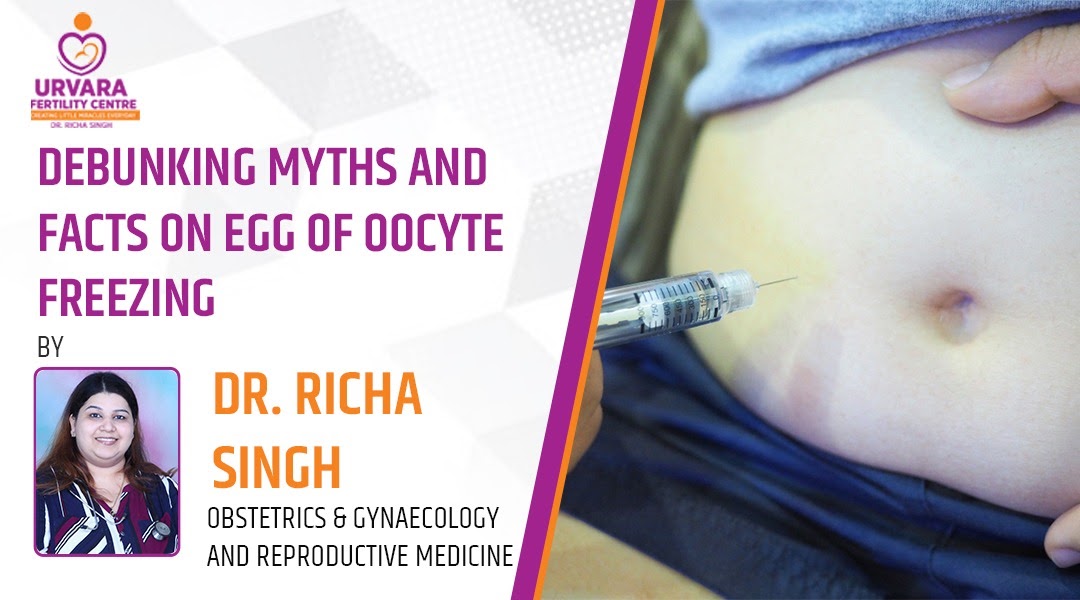Debunking Myth and Facts on Egg Freezing

Debunking Myth and Facts on Egg Freezing
A woman's fertility peaks in her twenties and begins to drop beyond the age of thirty. In fact, by the time a healthy woman reaches the age of 30, her odds of conceiving begin to diminish, along with other fertility-related difficulties. Due to a variety of personal and professional obligations, many women are deferring family planning until their 30s and early 40s. Fertility preservation through egg freezing is one option to consider, as it allows women to extend their childbearing years by saving their younger, healthier eggs.
While it is unsurprising that egg freezing has gained popularity among women of all ages, it has also given rise to a slew of misunderstandings. Let's dispel some of the myths around egg freezing. For IVF treatment contact Dr. Richa who is the best infertility specialist in lucknow.

Myth #1: Egg freezing is a risky or experimental procedure.
Prior to 2013, everyone who chose egg freezing believed that the treatment was relatively new and that there was insufficient data on the reasons to pursue this method. However, scientific evidence suggests that egg freezing is safe and successful, and it is no longer considered experimental. The techniques utilised in egg freezing, such as ovarian stimulation, egg harvesting, and even cryopreservation, have been used for decades and are completely safe.
Myth #2: Egg freezing endangers both the woman and her kid, and no babies have been born from frozen eggs.
There is no evidence that ovarian stimulation or egg freezing harms women or their potential offspring. Extensive research has revealed no variations in the risk of birth malformations, chromosomal aberrations, or pregnancy difficulties when using frozen eggs or embryos (as compared to fresh eggs or embryos). In general, adverse effects are uncommon, and those that do occur are usually small. Egg freezing may boost your chances of having a kid later in life. It is not an insurance policy, but it is a strong tool that can help women have more options.
Myth #3: The procedure is excruciatingly painful and time-consuming.
The hormone medicine injections required to start the procedure are normally administered once a day for 10-12 days. During this time, a doctor will check in on your progress 2-3 times to see how your body is showing the response to medications .When you are ready, the doctor will complete the procedure by collecting your eggs during an egg retrieval surgery. While the phrase "surgery" may sound intimidating, there is no need to be concerned about this stage of the treatment because there will be no sutures or wounds and it will just take around 15 minutes and is done through ultrasound. From start to end, the entire process takes roughly two weeks.
Myth #4: Freezing eggs now will make you infertile in the future.
Understanding that multiple studies have found no evidence that the practise of egg freezing is damaging to a woman's future fertility is one of the most significant components of refuting egg freezing myths. Because egg freezing includes the removal of eggs from the body, many people wrongly believe that the procedure reduces the number of eggs accessible for future pregnancy. This is a misconception, as women ovulate every month. We employ medication during the egg freezing process to ensure that numerous eggs develop and mature, keeping some of those otherwise "lost" eggs for later use.
Myth #5: Fresh eggs are superior to frozen eggs.
According to current statistics, frozen egg cycles result in more healthy pregnancies than fresh egg cycles. Furthermore, research has found no difference in the likelihood of birth malformations, chromosomal anomalies, or pregnancy problems when comparing pregnancies resulting from frozen eggs against pregnancies resulting from fresh eggs. It is critical to remember that when it comes to fertility, the age of your eggs is the most crucial factor. Your eggs will be healthier if they are younger. Live birth rates begin to fall by 10% every two years after the age of 35 for women who use their own eggs of the same age during in vitro fertilisation.
Myth #6: Egg freezing is exclusively a possibility for the wealthy or women with high-level employment.
Women choose to freeze their eggs for a variety of medical and social reasons. Many women opt to freeze their eggs as a result of a medical diagnosis; others choose to freeze because they do not believe they have the ideal environment to have a child, for example, due to financial constraints, the absence of a partner, or other commitments that must be balanced. There are numerous reasons for egg freezing, and each person approaches the subject from a different angle. In today's world, the majority of women who store their eggs do so because they haven't met the perfect spouse. Book your appointment with the best IVF hospital in lucknow.
Myth #7: Egg freezing is an excellent insurance policy for women in their late 30s.
It is actually preferable to freeze your eggs before the age of 35. Fertility rates steadily fall as we age, therefore freezing your eggs at a younger age gives you a better chance of success. Because some women in their 30 ‘s aren't sure when they want to have children, it's most useful for women in their early 30s. They may not have settled down yet, but they are considering it, and their eggs are still fine.
To more about egg freezing and having the freezing at the best facility Schedule your appointment with Dr. Richa Singh who is the best infertility doctor in lucknow.